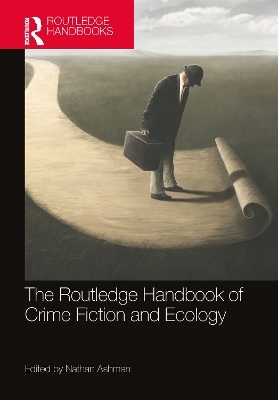
The Routledge Handbook of Crime Fiction and Ecology
Routledge (Verlag)
978-0-367-55085-1 (ISBN)
The Routledge Handbook of Crime Fiction and Ecology is the first comprehensive examination of crime fiction and ecocriticism. Across 33 innovative chapters from leading international scholars, this Handbook considers an emergent field of contemporary crime narratives that are actively responding to a diverse assemblage of global environmental concerns, whilst also opening up ‘classic’ crime fictions and writers to new ecocritical perspectives. Rigorously engaged with cutting-edge critical trends, it places the familiar staples of crime fiction scholarship – from thematic to formal approaches – in conversation with a number of urgent ecological theories and ideas, covering subjects such as environmental security, environmental justice, slow violence, ecofeminism and animal studies. The Routledge Handbook of Crime Fiction and Ecology is an essential introduction to this new and dynamic research field for both students and scholars alike.
Nathan Ashman is Lecturer in Crime Writing at the University of East Anglia and the author of James Ellroy and Voyeur Fiction (2018). His research spans the fields of crime fiction, contemporary American fiction, and ecocriticism, with a particular specialism in the works of James Ellroy. He has published articles on numerous writers including Ross Macdonald, E.C. Bentley, Don DeLillo,Megan Abbott and Walter Mosley. His second book, James Sallis: A Companion to the Mystery Fiction, is forthcoming.
Placing Crime Fiction and Ecology: An Introduction
Nathan Ashman
Part I: Space and Topography
Affect in Peter May’s Lewis and Harris Novels
Terry Gifford
"The Goshawk Did It": Nature Writing and Detection in Ann Cleeves’
The Crow Trap
Ian Kenny and Irina Souch
The Norfolk Saltmarsh: Elly Griffiths and Place in Contemporary Crime Fiction
Nicola Bishop
The Big Deep: The Ecological Turn in Nordic Noir
Michael Hinds and Tomas Buitendijk
Aesthetic Imaginaries of Nature and Nationhood in the Works of Arnaldur
Indriðason
Priscilla Jolly
Unsettlement, Climate and Rural/Urban Place-Making in Australian Crime
Fiction
Rachel Fetherston
Part II: Bodies and Violence
Pest Control: "Wasp Season" in Agatha Christie’s "The Blue Geranium"
Alicia Carroll
Green Machinations: Unknown Poison, Ecology and Female Criminal Agency in
L.T. Meade’s The Sorceress of the Strand
Caitlin Anderson
"Scorched Earth": Transgressive Bodies, Historic Criminality, and Colonial
Recursions in Louise Erdrich’s The Round House
Malinda Hackett
"Animals Taking Revenge": Imagining Murder as an Ecological Encounter in
Olga Tokarczuk’s Drive Your Plow Over the Bones of the Dead
Andrew Yallop
Protecting the Rhinos and Our Young Democracy: Nature and the State in
Post-Apartheid South African Crime Fiction
Colette Guldimann
"Look at Mother Nature on the Run": ‘The Troubles’ in Adrian McKinty’s Sean
Duffy Novels
Bill Phillips
Environmental Crime and the Dialectics of Slow and Divine Violence in
Poso Wells by Gabriela Alemán
Rafael Andúgar
Part III: Epistemologies
"Holmes, that’s some Santa Claus shit": Reading Lydia Millet’s A Children’s
Bible as Ecological Crime Fiction
MaKenzie Hope Munson and Kevin Andrew Spicer
John D. MacDonald and the Advent of Ecocrime Fiction
Kristopher Mecholsky
Choking to Death: True Crime and the Great Smog
Anita Lam
"Every Crime Has its Peculiar Odor": Detection, Deodorization and Intoxication
Hsuan Hsu
In Paolo Bacigalupi’s Environmental Science Fiction, Immoral and Criminal are
not Synonymous
Patrick D. Murphy
From Crime Scene to Anthropocene in 2010s Argentinian Narrative
David Conlon
Ecologemes in Contemporary Australian Crime Fiction: The Case of Outback
Noir
Katrin Althans
Part IV: Criminality and Justice
Revising Crime in Fiction: An Environmental Invitation
Marta Puxan-Oliva
Criminal Violences: The Continuum of Settler Colonialism and Climate
Crisis in Recent Indigenous Fiction
Rebecca Tillett
Environmental Racism and Post-Katrina Crime Fiction
Ruth Hawthorn
Seeking Environmental Justice: Muti in South African Crime Fiction
Felicity Hand
A Form of Wild Justice: Carl Hiaasen’s Deployment of Carnivalesque
Environmental Ethics and Moral Technology
Anna Kirsch
Environmental Concerns in Carl Hiaasen’s Crime Fiction
David Geherin
New Energy, Old Crime: Forms of Individual and Collective Responsibility
in Nordic Crimes Series
Leonardo Nolé
Part V: Energy, Globality and Circulation
"It Tasted Like Gasoline": The American Roman Noir and the Oil Encounter
in Elliott Chaze’s Black Wings Has My Angel (1953)
Nathan Ashman
Oil and the Hardboiled: Petromobility, Settler Colonialism and the Legacy
of the American Century in Thomas King’s Cold Skies
Alec Follett
"The Whole World…Was a Gigantic Prison": Climate Crisis and Carceral
Capitalism in Rachel Kushner’s The Mars Room
Megan Cole
Reading Donna Leon as Mediterranean Noir
Valerie McGuire
The Circulation of Global Environmental Concerns: Local and International
Perspectives in the Verdenero Collection and Donna Leon’s Crime Fiction
Aina Vidal-Pérez
Magic Seeds and The Living Dead: Investigating Transnational Eco-Crimes
in Rajat Chaudhuri’s The Butterfly Effect
Damini Ray
| Erscheinungsdatum | 31.10.2023 |
|---|---|
| Reihe/Serie | Routledge Literature Handbooks |
| Zusatzinfo | 3 Halftones, black and white; 3 Illustrations, black and white |
| Verlagsort | London |
| Sprache | englisch |
| Maße | 178 x 254 mm |
| Gewicht | 988 g |
| Themenwelt | Geisteswissenschaften ► Sprach- / Literaturwissenschaft ► Anglistik / Amerikanistik |
| Geisteswissenschaften ► Sprach- / Literaturwissenschaft ► Literaturwissenschaft | |
| Naturwissenschaften ► Biologie ► Ökologie / Naturschutz | |
| Recht / Steuern ► EU / Internationales Recht | |
| Recht / Steuern ► Strafrecht ► Kriminologie | |
| Technik ► Umwelttechnik / Biotechnologie | |
| ISBN-10 | 0-367-55085-7 / 0367550857 |
| ISBN-13 | 978-0-367-55085-1 / 9780367550851 |
| Zustand | Neuware |
| Haben Sie eine Frage zum Produkt? |
aus dem Bereich


